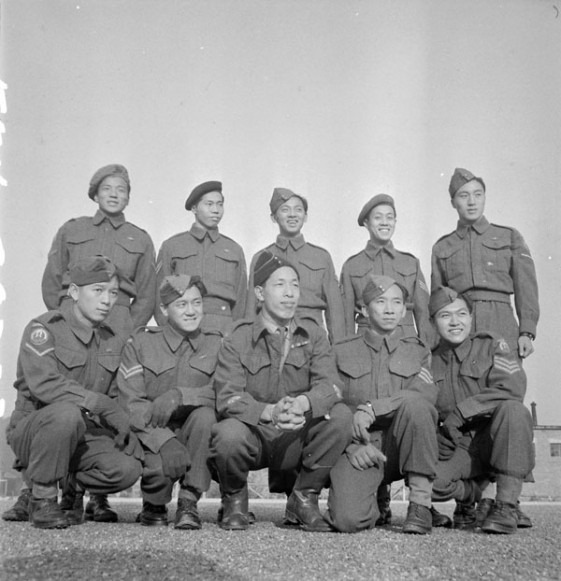Fighting back
Exclusionary and discriminatory laws and policies within Canadian society stifled development of the Chinese Canadian community in insidious ways, including barring the sons and daughters of first and second generation immigrants from many professions, simply because of their racial origin.
The Second World War brought many changes for Chinese Canadians. China was now seen as an ally in the War in the Pacific, and Canadians had seen the suffering of the Chinese people.
Attitudes toward the Chinese in Canada began to change.

Chinese-Canadian soldiers from Vancouver, British Columbia, Canada, who served with the South East Asia Command (SEAC), awaiting repatriation to Canada, No.1 Repatriation Depot (Canadian Army Miscellaneous Units), Tweedsmuir Camp, Thursley, England, 27 November 1945.
In Vancouver, the Chinese Canadian community had raised more money per capita than any other group for the war effort, and some of its sons and daughters had volunteered for duty even without being recognized as full citizens in Canada, which was for many the country of their birth.
Racism and discrimination against the Chinese could no longer be upheld in policy, following the Nazis persecution of the Jews, and Canada needed to change its policies. It did so with the promulgation of its Citizenship Act in 1947, though it would be another two decades before policy reform would again allow independent immigration of Chinese to Canada.
With the lifting of restrictions and limits placed on their civil rights, successive generations of Chinese Canadians have used the law to defend themselves, and even resorted to challenging the law to restore their rights as citizens. They have moved away from being victimized by the laws of Canada to participate in the country’s legal system as lawyers, judges and legislators. Many Chinese Canadians retain strong ties to their community, ever respectful of its history and role in building Canada.
Road to Justice has had the pleasure of speaking with some of these lawyers or their families and community activists, whose interviews can be found here.







